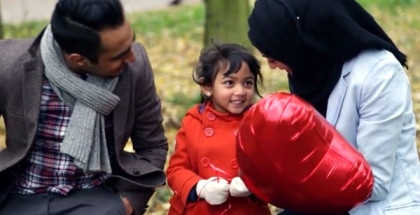I live in Spain with my husband and I suffered from several miscarriages. My doctor suggested for us to consider other options such as adoption. Is there an Islamic way to give the child our family name without committing something wrong?

Question
For years I had problems keeping my pregnancies and no one but Allah knows why. Now we reached the time that doctors tell us to stop trying medically and consider other options.
My husband and myself would like to adopt an orphan, but as we are living in Europe, everything is through adoption as most of the kids have no legal papers and in order to get the kid home and take care of him/her we need clear legal documents.
Is there a way in Islam to allow us to make the requested court papers (that means giving the family name to the kid) but at the same time maintain a halal process so we do not upset Allah.
Thank you very much for your help,
Answer
The reward of Paradise
Islam encourages sponsoring orphans, rearing them, treating them kindly and seeing to their needs and interests to the extent that the Prophet [pbuh] promised that the person who sponsors an orphan will enter Paradise alongside him.
Evidence from the Sunnah
"The one who raises an orphan and I are like these [two] in Paradise (and he pointed to his middle and index fingers)" (Bukhari).
"An orphan's guardian, whether he is a relative or non-relative, and I are like these two in Paradise" (Muslim)
"Whoever takes in the orphan of two Muslim parents and provides him with food and drink until he can support himself, will enter Paradise" (Ahmed)
"The best of homes in the sight of Allah is that in which an orphan is well treated" [reported by al-Tabarani from a raised-chain hadith narrated by Ibn 'Umar, may Allah be pleased with them both).
"The person who provides for a widow and a needy person is like one who strives for the sake of Allah:, and I think he said, "like the person who does not tire of praying and the person who frequently fasts" [reported by Bukhari and Muslim from a narration of Abu Hurayrah, may Allah be pleased with him].
Adoption in Islam
Adoption is taking in another's child as one's own. Islam prohibits adoption and deems all its consequences invalid as attested to by the words of Allah,
"nor does He make your adopted sons into real sons. These are only words from your mouths, while God speaks the truth and guides people to the right path. Name your adopted sons after their real fathers; this is more equitable in God's eyes—if you do not know who their real fathers are [they are your] 'brothers-in-religion' and protégés."
(Qur`an 33:4-5)
Allah commanded that whoever sponsors an orphan child is not to attribute it to himself, but to its biological father if he is known; otherwise, the child should be called 'Mawla' or 'brother-in-religion'. In this way, Islam prevents people from changing truths and preserves the rights of heirs from loss or reduction, protects against mingling between the sexes, and being in the private company of a non-mahram [persons to whom marriage is legitimate] such as that between the male adoptee and the maharem [persons to whom marriage is illegitimate] of his adoptive father as well as between a female adoptee and her adoptive father, his sons and male relatives.
It is permissible In Islamic law for the guardian of an orphan, man or woman, to add his/her family name to that of his ward who is an orphan or a child of unknown parentage. It is likewise permissible to change the last component of the child's full name to that of his guardian in a manner that shows the ward's affiliation to his guardian without deceiving the child or others that he is the guardian's biological offspring. The purpose is to remove the affiliation from the scope of adoption which is prohibited in Islamic law. Such an addition to the child's full name is tantamount to the bonds of loyalty between the Arabian tribes of old. This is permissible in Islamic law and achieves the child's interests in the different phases of his life though the principles of Islamic law concerning adoption and its legal consequences must be preserved.
 Arabic
Arabic French
French Deutsch
Deutsch Urdu
Urdu Pashto
Pashto Swahili
Swahili Hausa
Hausa
